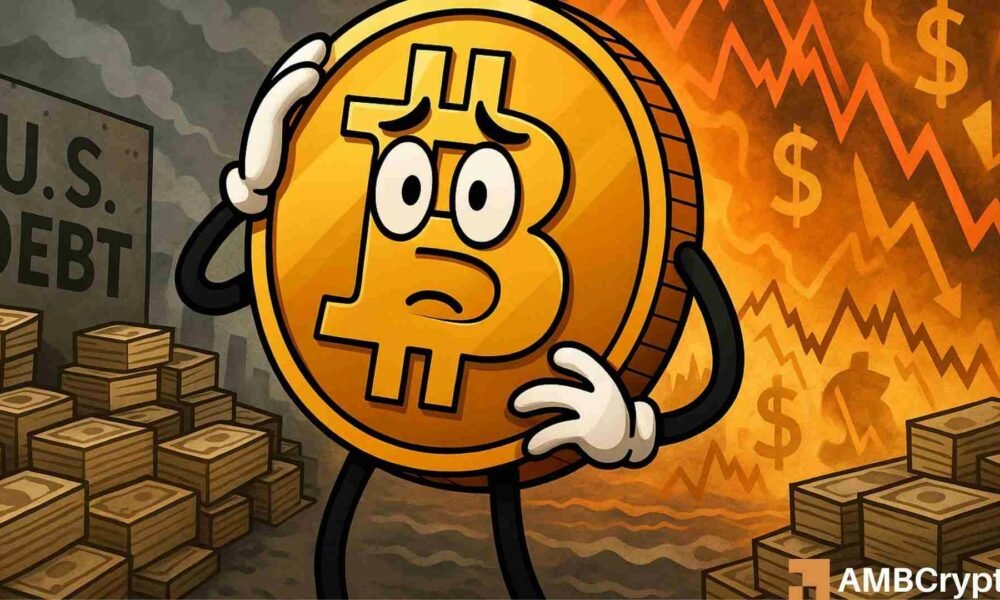The Implications of U.S. Debt on Wealth Preservation and Bitcoin’s Position in Today’s Market Landscape
In recent weeks, heightened concerns surrounding U.S. debt have sparked intense discussions within financial circles, especially following the passage of a significant tax and spending bill that is projected to increase national debt by over $3 trillion in the next decade. Notable investors such as Ray Dalio, founder of Bridgewater Associates, have voiced alarming warnings regarding the potential ramifications of this fiscal chaos. With predictions that the debt burden could become increasingly unsustainable for American families, analysts are now assessing the potential impacts on traditional currencies like the U.S. dollar and the implications for alternative assets, particularly Bitcoin (BTC).
Dalio’s concerns revolve around the idea that higher taxes, reduced government spending, or increased money printing could emerge as necessary responses to manage the ballooning debt. Such outcomes could dilute the value of the U.S. dollar, diminishing the wealth of those who rely on it as a stable store of wealth. He remarked, “This printing and devaluing is not good for those holding bonds as a storehold of wealth,” emphasizing that adverse effects on bonds and U.S. credit markets could have broader implications for the entire economy. The juxtaposition between growing U.S. liabilities and the inherent limitations of Bitcoin’s supply creates a compelling narrative for investors seeking preservation and hedging strategies amidst fiscal uncertainty.
Many crypto proponents view current economic instability as a perfect storm for Bitcoin. Unlike traditional currencies that can be printed at will, Bitcoin is a digital asset with a fixed supply, making it a potentially more reliable store of value in times of inflation. In light of Dalio’s warnings, industry leaders like Bitwise CIO Matt Hougan and Real Vision’s Raoul Pal extol the virtues of Bitcoin as a “buy” option. Pal specifically highlighted that in a landscape of asset debasement, the top-performing hedges are tech and crypto, suggesting a transition toward alternative, decentralized assets as a response to government fiscal policies.
Interestingly, while Dalio acknowledges his own holdings in Bitcoin, he leans towards gold as a more stable asset due to its historical price stability amidst geopolitical tensions. He finds Bitcoin’s pricing fluctuations less predictable, which introduces a level of uncertainty. In contrasting perspectives, BlackRock CEO Larry Fink presented an intriguing viewpoint, likening Bitcoin to “digital gold.” Fink indicated that if U.S. fiscal management doesn’t improve, Bitcoin could replace the U.S. dollar as the world’s reserve currency, showcasing the potential of cryptocurrency to reshape capital markets.
In contrast, some officials, such as Treasury Secretary Scott Bessent, maintain a more optimistic outlook, downplaying the debt concerns with assertions that the U.S. GDP is growing at a faster rate than national debt. He anticipates this trend will persist, soothing fears about fiscal responsibilities. However, analysts from Coinbase have raised caution about the far-reaching implications of the recently dubbed “Big Beautiful Bill,” suggesting it could lead to a $5 trillion hike in the debt limit. The potential for the U.S. Treasury to utilize its cash accounts for borrowing could disrupt liquidity in the market and exert pressure on risk assets, including Bitcoin.
Moreover, the anticipated increase in treasury borrowing could spur a liquidity squeeze that affects investment confidence across risk assets. This could have immediate repercussions, posing a downside risk for cryptocurrencies, including BTC. Market sentiments reflect an ongoing balancing act as investors navigate the challenges posed by economic instability and rapidly evolving financial landscapes. In conclusion, while Bitcoin may offer a hedge against potential dollar devaluation, significant market dynamics surrounding U.S. debt remain key variables that could heavily influence both traditional and alternative asset classes in the near future.
In a world of escalating debt and uncertainty, the significance of Bitcoin continues to grow as both a defensive asset and a beacon of hope for wealth preservation. As more investors weigh their options, the ongoing dialogue around fiscal policy and its repercussions on currency valuation will undoubtedly shape the trajectory of cryptocurrencies like Bitcoin.


